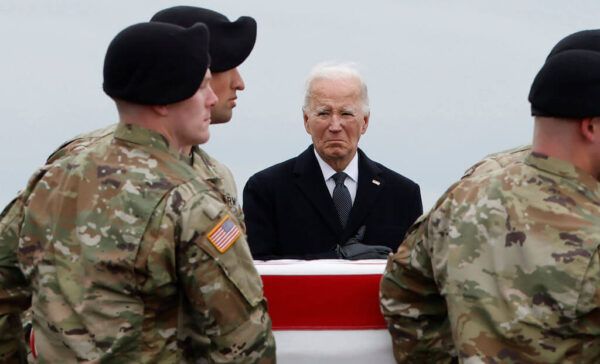The United States launched a strike in Baghdad Wednesday that killed a pro-Iranian paramilitary commander in response to the drone attack on a U.S. base in Jordan that claimed the lives of three Black soldiers in late January.
However, critics argue that a series of U.S. retaliatory strikes over the past week falls short of what is necessary to deter Iran from sponsoring further proxy attacks in the region, which were threatening to broaden Israel’s war with Hamas.
The Feb. 7 drone strike by the U.S. blew up an SUV carrying the commander of the Kataib Hezbollah group and two of his guards, killing all three militants, according to the United States Central Command in the Middle East.

“We will not hesitate to hold responsible all those who threaten our forces’ safety,” CENTCOM said in a statement following the strike.
Authorities did not disclose the name of the rebel group commander, but the Kataib Hezbollah confirmed in a statement that its leader, Abu Baqr al-Saadi, was killed in a drone strike, leading the group to suspend its attacks on American forces in Jordan.
U.S. officials confirmed the strike was part of the response President Joe Biden ordered last week in retaliation for the deadly attack on the U.S. base.
A broader series of airstrikes were carried out last Friday on targets linked to nearly 170 attacks by Iranian-backed militias on U.S. forces in Iraq and Syria.
The strikes, which hit three locations in Iraq and four in Syria, took aim at more than 80 individual targets, the government said, including command-and-control centers, intelligence hubs, as well as missile and drone storage facilities.
Despite what appeared to be a firm military response, the White House faced growing criticism from pro-Israeli advocates who said the U.S. was being too soft on Iran and not sending a “strong enough message” to thwart the proxy attacks.
“Our recent responses have not been sufficient to deter aggression,” said E.J. Kimball, Director of Policy & Strategic Operations with the U.S. Israel Education Association, in a statement to Atlanta Black Star. “Although these strikes on proxy groups were intended as a measured response, they have fallen short in delivering a strong message to Iran.”
U.S. officials said it remains unclear who is responsible for the Jordanian base attack, while Iran continues to deny any role, although Tehran has been implicated in a litany of proxy attacks since the war began Oct. 7.
For weeks, Iranian-backed Houthi militants have attacked merchant ships in the Red Sea and the Gulf of Aden, firing missiles from Houthi-controlled areas of Yemen.
The Houthi rebels reportedly fired at least six anti-ship missiles this week as the U.S. struck back against the militants.
Back in Washington, Kimball accused the Biden administration of going through the motions and “emboldening” Iran by not punishing them directly for the proxy attacks, which aimed to spark additional conflicts with Israel on multiple fronts.
He called the most recent U.S. strikes a lukewarm approach that would ultimately fail to end Iran’s targeted attacks throughout the region.
“These measures won’t escalate into a wider conflict, but they also won’t cease Iran’s targeted attacks,” he said. “Providing advanced warnings of our strikes has only served to undermine their effectiveness, rendering them as superficial and putting our troops at greater risk.”
The Jan. 28 drone strike hit a housing unit on the U.S. logistics support base in Jordan, killing three and injuring more than 40 other troops. Eight soldiers sustained serious injuries in the blast and had to be airlifted to regional medical centers.
According to the Defense Department, the dead service members were identified as Sgt. William Jerome Rivers of Carrollton, Georgia; Spc. Kennedy Ladon Sanders of Waycross, Georgia; and Spc. Breonna Alexsondria Moffett of Savannah, Georgia. All three were assigned to the 718th Engineer Company, 926th Engineer Battalion, 926th Engineer Brigade, Fort Moore, Georgia.
The troops were stationed in northeastern Jordan near the Syrian border as part of Operation Inherent Resolve, a mission that aims to eliminate ISIS terrorists throughout the Middle East.
A day later, Defense Secretary Lloyd Austin issued a statement expressing outrage over their deaths.
“These brave Americans and their families are in my prayers, and the entire Department of Defense mourns their loss,” he said.
Kimball said the explosive situation in the Middle East continues to demand a “more direct approach.”
“It’s clear that Iran and its proxies will not stop until the United States displays a direct strike on Iranian assets,” he said. “Only through a firm and immediate show of force can we expect to ensure the safety of our forces and restore stability in the region.”
U.S. officials have defended the strikes as necessary to bring down Iran’s massive terrorist network throughout the Middle East, however, Washington had no plans for a long-term military campaign, Pentagon press secretary Major General Pat Ryder said earlier this week, noting that the current mission to bring down the proxy network was “not complete.”
Meanwhile, Iraqi government authorities accused the U.S. of launching a haphazard response, claiming the recent airstrikes impacted Iraq’s security forces without warning.


